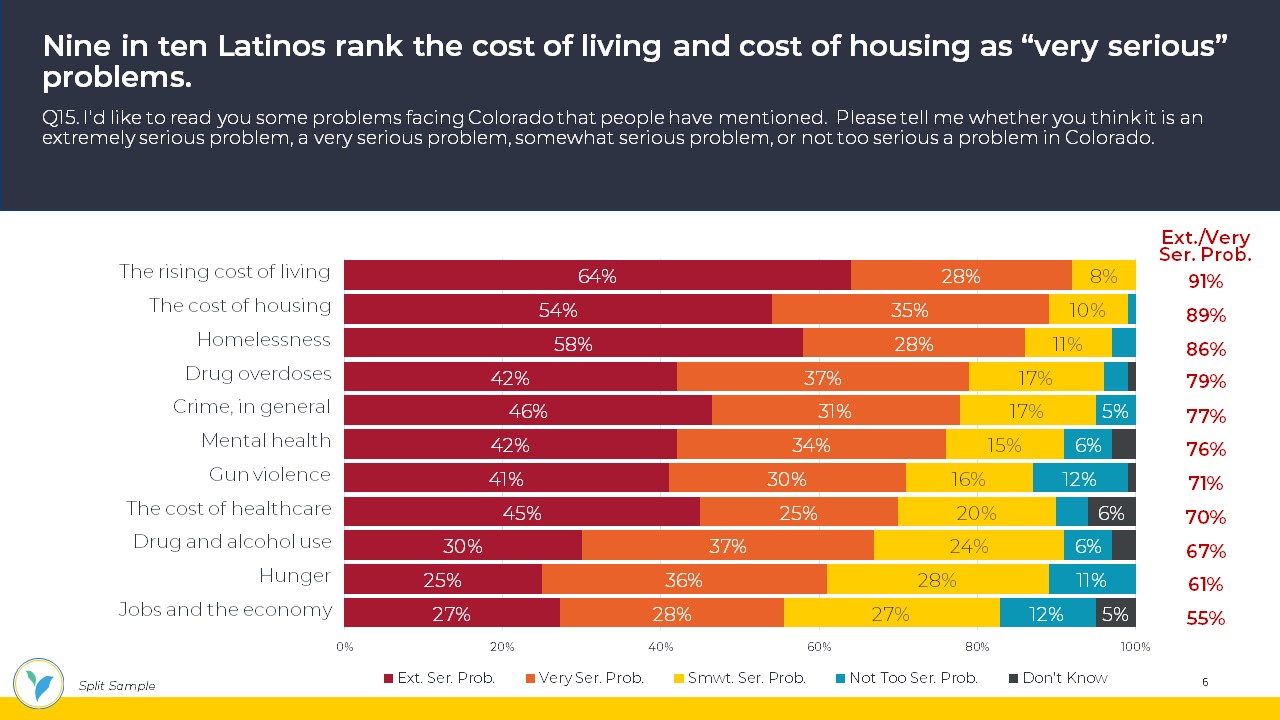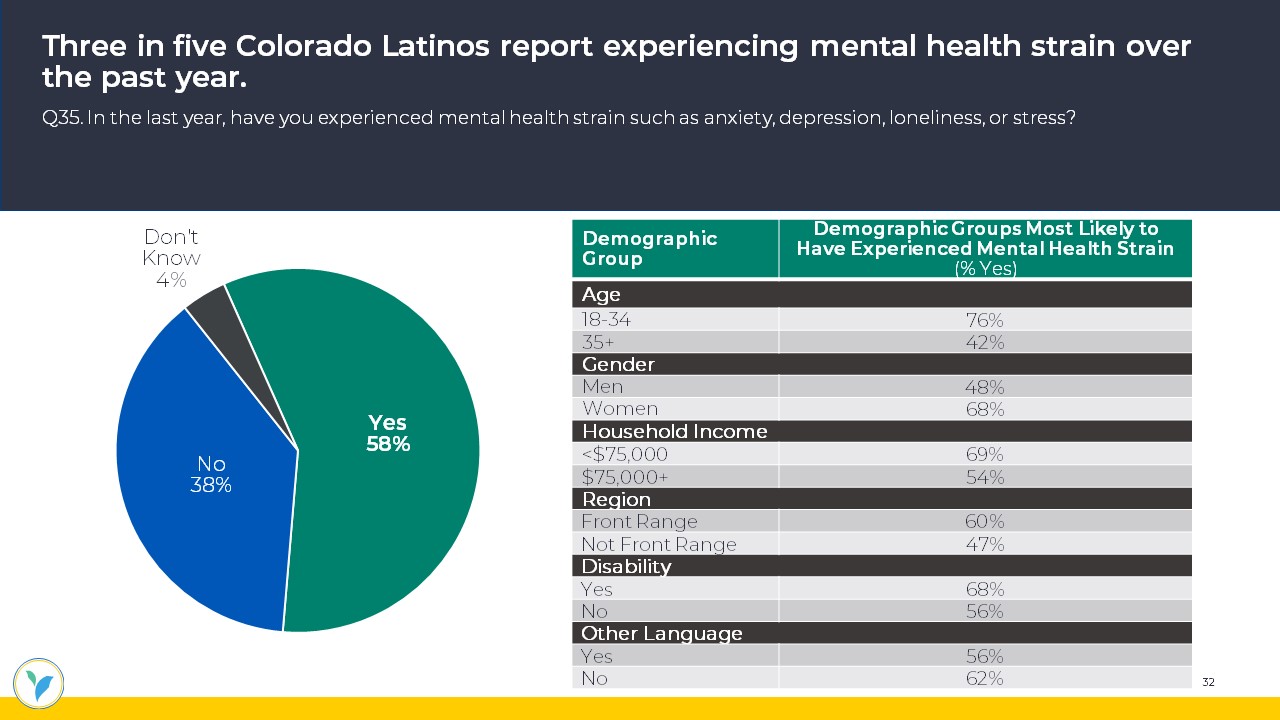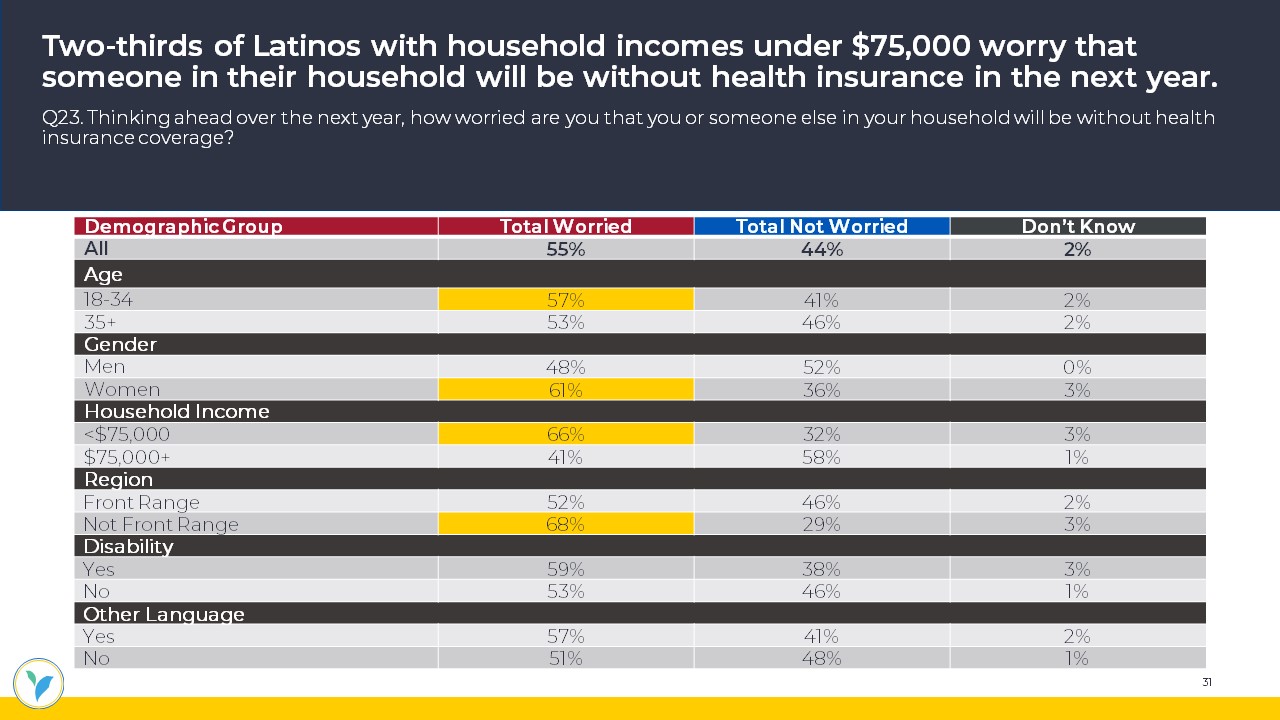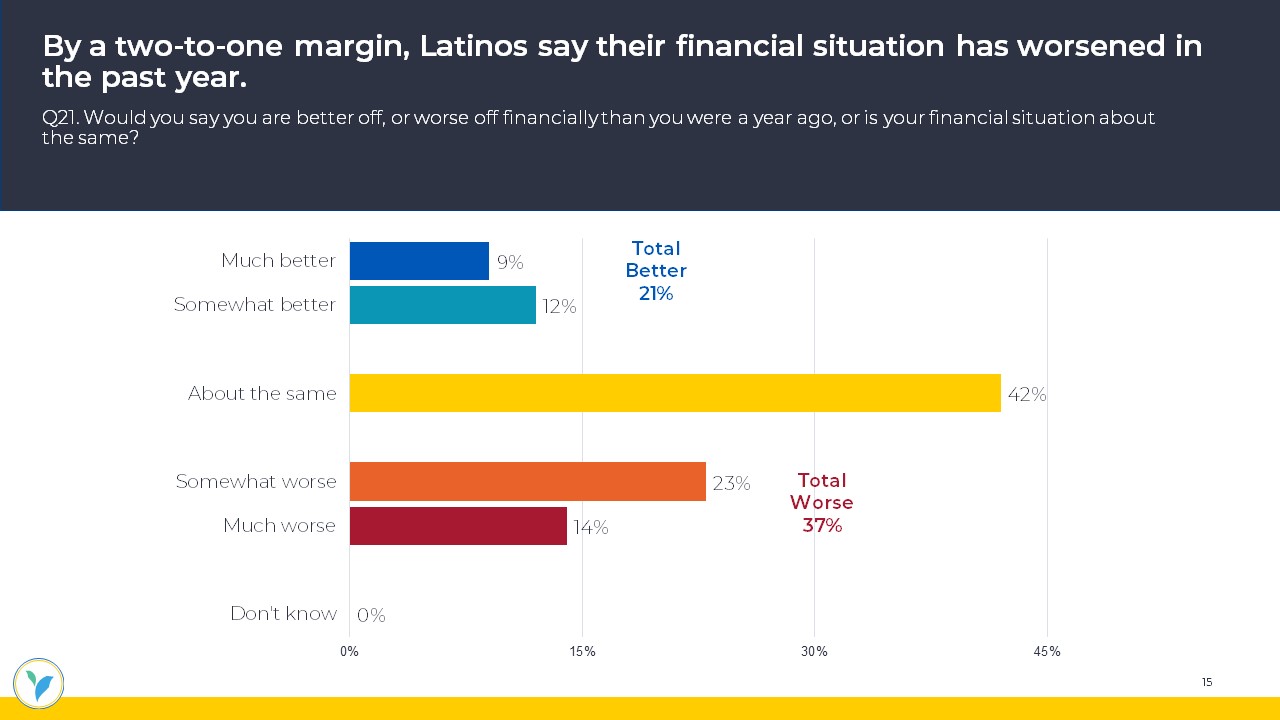Press Contacts:
For interview opportunities with members of The Colorado Health Foundation, the research team and/or representatives from partner organizations and Colorado residents directly impacted by the topics covered in the 2022 Pulse Poll, please contact:
Marty Schechter (ENGLISH), marty@schechterpr.com, 303-882-4585
Virginia Ovejero (SPANISH), virginiaovejero@yahoo.com, 303-324-5075
Austin Montoya (For CHF Inquiries), amontoya@coloradohealth.org, 303-953-3686
FOR IMMEDIATE RELEASE
Sept. 18, 2023
Please note: In this press release, the terms "Hispanic" and "Latino" are used interchangeably to refer to ethnicity, culture, and identity. However, we recognize that they have different meanings. While we use these terms interchangeably as an umbrella reference, we acknowledge the diversity of experiences and preferences among individuals who identify with these or other cultural labels.
DENVER, COLORADO – Today, Pulse: The Colorado Health Foundation Poll, a trusted source for understanding the diverse perspectives and experiences of Coloradans, is releasing its latest findings, shedding light on the pressing concerns of Hispanic and Latino communities in the state. This comprehensive survey reveals the top issues facing Hispanic and Latino Coloradans, highlighting their perspectives on cost of living, housing affordability, mental health, health care, crime, and more. A bipartisan team of researchers collected responses from 2,639 adults, including 462 Latinos across the state, between April 8 - May 3, 2023.
This deep dive into responses from Latino and Hispanic Coloradans reveals the experiences, including the unique challenges, concerns and aspirations of this significant demographic.
“In this study, we've seen shifting concerns among Latino Coloradans. While the pandemic was a major worry, the focus has evolved. Concerns about high living costs, housing affordability, homelessness, crime, health care and politics weigh heavily on Latinos, and raise additional concerns about the future. As Latino immigrants, we seek opportunities and self-sufficiency, and many Latinos believe programs for housing and food access could help address these issues,” said Enrique Castillo, bilingual Pulse pollster and president of Castillo & Associates. “The worry about affording your rent or mortgage spans all socioeconomic groups. And when 40% question their ability to put food on the table, it's a troubling sign.”
As you explore the additional findings from the 2023 Pulse Poll, note that The Colorado Health Foundation has assembled a list of experts who are available to connect with members of the media. Click here to access the list of experts.
Shared Concerns: Cost of Living, Affordable Housing and Homelessness
The top concerns of Hispanic and Latino Coloradans are shared across all demographics in this year’s poll.
When asked in an open-ended question about the most important issues facing Colorado, Hispanic and Latino respondents consistently identified the cost of living (20%) and housing affordability (17%) as their top concerns. Moreover, a staggering 91% expressed extreme or very serious concerns about the rising cost of living, while 89% highlighted the issue of housing affordability, closely followed by worries about homelessness (86%). These anxieties in the Hispanic/Latino community have steadily increased since 2020. In 2020, 44% of Hispanics/Latinos said homelessness was an “extremely serious problem,” compared to 58% in 2023 (a 14% jump).
The concern over housing affordability and homelessness is exacerbated by the troubling fact that 37% of Latinos responded affirmatively when asked whether they or someone they know had experienced unfair treatment when attempting to rent or purchase a place to live.

Concerns Beyond Housing and Costs
In addition to housing and affordability concerns, the poll identified three core themes in the experiences of Hispanic and Latino Coloradans: mental health and health care; crime and gun violence; and economic concerns.
Significant portions of Hispanics report substance use concerns, mental health strain and financial challenges delaying or preventing care.
Almost eight in 10 Hispanics say drug overdoses, mental health, and the cost of health care are very serious problems in the state. Concerns regarding drug and alcohol use closely follow, with approximately seven out of ten (67%) sharing these concerns.
Concerns related to mental health continue to surge with 76% of Hispanic Coloradans saying it’s an extremely/very serious problem, up from 47% in 2020.
Perhaps most concerning in that growth is the 58% of Latino Coloradans who reported they’ve experienced mental health strains such as anxiety, depression, loneliness or stress in the last year; and more than one in four (29%) said they have postponed seeking mental health care in the last twelve months, primarily due to financial challenges.
- Hispanic/Latino women are more likely than their male counterparts to report experiencing mental health strain (68% of Hispanic/Latino women compared to 48% of Hispanic/Latino men).
- 76% of Hispanics/Latinos aged 18-34 said they’ve experienced mental health strain.
- 69% of those with household incomes below $75,000 have experienced mental health strain compared to 54% of higher income Latinos.

Of those experiencing mental health strain, about 3/4 are discussing their concerns with friends or family members (76%), and 32% are discussing them with a professional health care provider.
A variety of mental health solutions are seen as effective.
When asked how to improve mental health in Colorado, respondents found several actions effective. These included making it easier for people to access mental health screenings and services at the same places where they receive physical health care (87% effective) and increasing government investments in programs outside of health care settings aimed at preventing mental health and substance use challenges (considered 84% effective).

Health care disparities and concerns about insurance continue for Hispanic and Latino Coloradans.
More than 1 in 10 Hispanic/Latino Coloradans reported they do not have health insurance, and nearly six in 10 (55%) respondents are worried they or someone in their household will be without health insurance in the next year.

Another alarming finding from this year’s poll, 38% of Latino respondents said they have postponed medical or dental care in the last year. When asked in an open-ended question why they’ve postponed care, more than 1 in 3 (38%) said it was related to cost and ability to pay for the services, and 17% stated that their insurance wouldn’t cover the service.

A third of Hispanic respondents say they or someone they know has experienced unfair treatment when seeking health care services because of their race or ethnicity.
Crime and Gun Violence
Gun violence concerns are at an all-time high.
Concerns about gun violence are at 71% among Latinos/Hispanics. Closely connected, concerns about crime in general rose to an all-time high of 77%.
- Those who had extremely serious concerns about gun violence increased an 11%, from 30% in 2021 to 41% in 2023 among Hispanics.
Nearly half of Latinos/Hispanics (48%) noted police violence and misconduct as a serious problem – compared to 35% of all Colorado respondents – with 1 out of 4 responding that the matter is extremely serious.
Economic Challenges
The Pulse Poll's findings highlight a significant concern among Hispanic and Latino Coloradans regarding their economic future.

Approximately 53% of Hispanic and Latino respondents indicated that they are currently "just getting by financially," with a striking 18% describing their financial situation as "really struggling." Moreover, the survey revealed that 37% of Hispanic/Latino respondents felt they were "worse off" financially compared to the previous year, indicating a troubling trend.
- Latinos living on less than $75,000 are more likely to say they’re worse off financially than they were a year ago, 47% compared to 20%.

This financial unease is further compounded by worries about affording enough food, which were substantially higher among Latinos at 47%. Job security concerns were also prevalent, with 33% of Latinos expressing worries about their employment prospects over the next year.
For Hispanic and Latino parents, more than eight in 10 (82%) are worried that their children will not be able to afford to live in Colorado.
These findings underscore the pressing need for policies and initiatives aimed at addressing economic disparities and providing greater stability for Hispanic and Latino communities in Colorado.
REGISTER FOR PULSE BRIEFINGS
The Colorado Health Foundation hosts public briefings to provide insight and perspectives on its annual Pulse Poll findings. Members of the public are invited to join the final briefing for the 2023 survey. This briefing will share detailed data about the challenges and experiences of Hispanic and Latino Coloradans, the impact of those challenges, and the types of solutions they want to see prioritized by policymakers.
- Deep Dive with an Emphasis on Responses from Hispanic and Latino People in Colorado
(presented in Spanish with live interpretation in English)
Briefing at 10 a.m., Tuesday, Sept. 19
The following resources are available for download.
The Colorado Health Foundation is committed to transparency, including access to the full results of Pulse. These resources are available in both English and Spanish and include:
- Hispanic/Latino subgroup topline results
- Hispanic/Latino subgroup cross-tabs
- Presentation deck on Hispanic/Latino findings with easy-to-read charts and graphs (English | Spanish)
- Complete topline results of all respondents (English | Spanish)
- Complete cross-tabs with data on how different sub-groups answered each question (English | Spanish)
- Complete presentation deck with easy-to-read charts and graphs (English | Spanish)
- Interactive data dashboard
About The Colorado Health Foundation
The Colorado Health Foundation is a nonprofit, nonpartisan organization bringing health in reach for all Coloradans by engaging closely with communities across the state through investing, policy advocacy and research. For more information, visit www.coloradohealth.org.
About Pulse
At The Colorado Health Foundation, we believe in the importance of listening, and that’s why each year we listen to Coloradans from across the state through our annual poll. From the increasing cost of living and lack of affordable housing, to health care and mental well-being, our poll takes the pulse of Coloradans on a range of important issues this year and every year – to inform policy that advances health equity. For more information, visit www.copulsepoll.org.
The 2023 Pulse Poll was conducted by telephone and online from April 8-May 3, 2023 among a random representative sample of 2,639 adults age 18 and older living in Colorado. The margin of sampling error for the full sample is +/-2.2% at the 95% confidence interval. For results based on subgroups, the margin of sampling error is higher.
# # #
